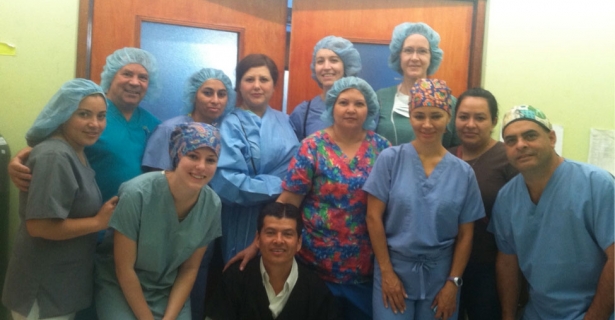Elayne Stecher is a senior (A14) majoring in International Relations and a member of BUILD: Nicaragua.
Scarcity. After living in Jordan last fall, I thought I understood water scarcity: the country’s very dry, bottled water is marked up, and sometimes the shower doesn’t work for a couple days (weeks). Coming to Nicaragua, I was so excited to see how green and lush everything looked in comparison, how richly saturated with color the countryside was. There is plenty of water – two oceans, two big lakes, rainfall every other day in Jinotega – but access to potable water is another issue entirely. Sure, there’s a stagnant pool of water about an hour hike up from Los Chaguites communities I work with, but while translating a potable water project proposal for AVODEC, I learned that the leading cause of infant death in Nicaragua is still contaminated water, which takes the lives of about 1 in every 5 children in rural communities. (Infant mortality has been decreasing across the country, but remains a real and troubling problem for isolated communities.)
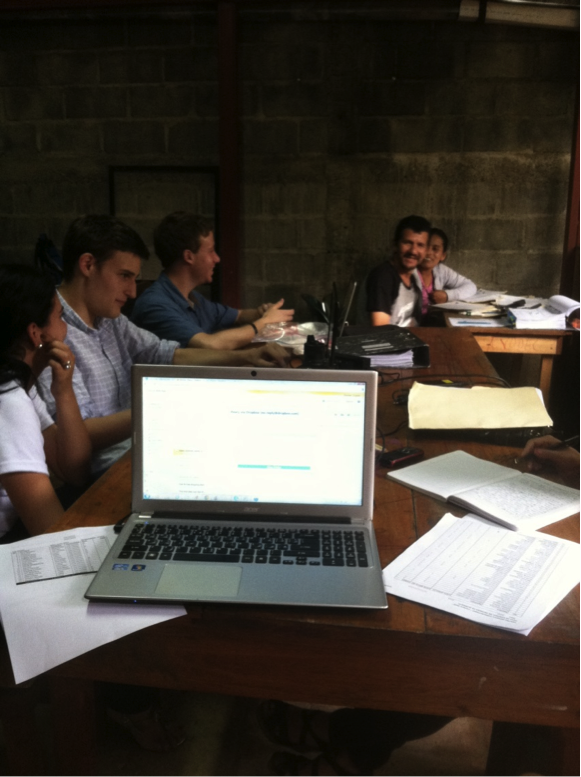
[Fellow BUILD-ers Tom and Jordan on the left in our office at AVODEC]
My partner organization, AVODEC, works to address various forms of scarcity in the department of Jinotega by identifying and alleviating immediate need and then focusing on the underlying causes of that need. Potable water projects are just one piece of the puzzle. June 21, fellow BUILD-er Tom and I gave a general presentation (attached) about DM&E at a capacity building workshop for AVODEC and its associates. Afterward, we witnessed the way that every associate appealed to AVODEC’s director, Don Victorino, to bring more projects into their region/town/community: scarcity is widespread and multifaceted.
The most sought-after program was the nutrition program which provides vitamin-enriched food to children under six once a day, Monday through Friday. This is the program I am most heavily involved in and helped to implement in three communities: Las Lomas, and the two of Los Chaguites. In the latter two, the road (and I say “road” very generously) that would allow a truck or motorcycle to access the remote valley where the communities are situated is completely impassable due to consistent rainfall and lack of repairs. When I make my weekly trek into the communities, I am really hiking through a jungle into a valley and back out again, which amounts to about 4 hours of sweaty, frustrating transit when all is said and done. I can’t even imagine having to do that hike every day, multiple times a day, to access the stagnant water which collects about when the road ceases to be a road as we understand it.
A different organization provided Los Chaguites with a well, but it has fallen into disrepair due to a lack of maintenance because the organization had trouble returning to the community to make repairs. In light of this, when AVODEC decided to become more involved in the communities, they realized that one of the most pressing issues to be addressed was the lack of passable roads. It influences access to water, access to the outside world (information, food, hospitals), and the willingness of aid organizations to come into the communities. So, in exchange for food for the communities’ children, the able-bodied fathers and brothers of the beneficiaries are repairing the roads.
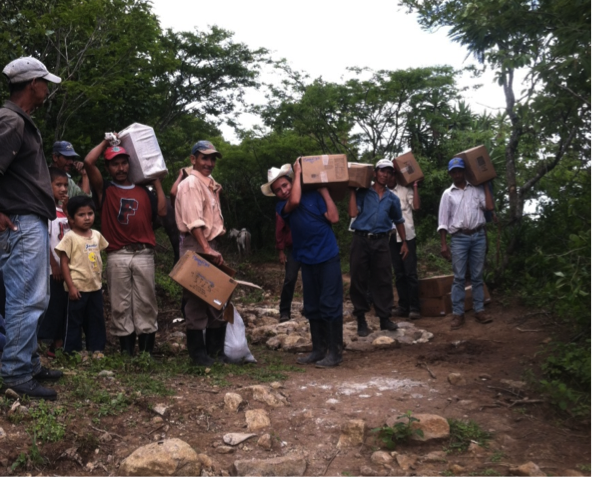
[These are the men of Los Chaguites carrying the food to their communities. Each box was ~38 pounds.]
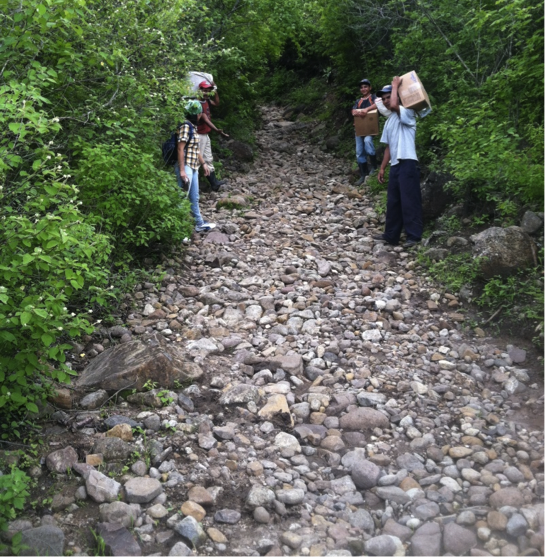
[Part of the roadway the men have repaired, digging a drainage ditch and bringing in smooth stones.]
The scarcities that affect this country are not always caused by a fault of resources but rather the misallocation of present resources that do not benefit the majority of the population. As such, it is difficult to change this system. However, by bringing outside aid and resources, AVODEC is attempting to change the shape of its community, and it has been a wonderful, interesting, frustrating, and incredibly educational process to witness and be involved in. As I wrap up my final week in Nicaragua, I am mindful of the people and projects I have engaged with, and grateful for the fact that despite everything, there was never a lack of kindness, support, and opportunities to grow here.
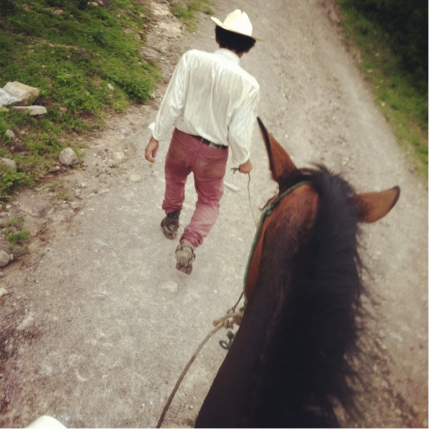
[This is Don Antonio. I met him leaving Los Chaguites. I shared my raisins with him so he let me ride his horse up out of the valley.]
Update # 1
Since late May I have been working with my partner organization, La Asociación de Voluntarios para el Desarrollo Comunitario (AVODEC), on a number of projects. AVODEC was founded by native Jinotegan Victorino Centeno to help his community after Hurricane Mitch in 1998 and has since expanded, although all of their projects are located within the municipality of Jinotega.
I am involved in three main projects. The first is infant nutrition in a region called “Los Lomos”. This project involves the distribution of MannaPack Rice (from Feed My Starving Children, a U.S. organization) to mothers with young children. The packets of rice and soy-protein are packed with vitamins to help brain development and are specifically for children aged 6 months – 6 years. AVODEC transports the food from a local church, where it is stored, to the target community and helps to organize the mothers into a rotation (each day, a different mother will cook the rice for all the children under six). Once a week, a social worker named Johana and I go to visit Los Lomos and ensure that the children are being fed, all the mothers are participating in the rotation, and to replenish the food supplies.
I am helping Johana to implement the same system in a larger community called “Los Chaguites”. Over 50 children under six and their mothers will participate in the nutrition program there.
My second project is assisting with the medical brigades that an organization called Esperanza organizes and AVODEC facilitates. I had the opportunity to work with the first brigade last week (June 9 -15) and helped translate during 31 operations and the corresponding consults with patients and their parents (I was one of three translators).
My last project is translating various documents from Spanish into English or English to Spanish. These documents are usually related to project development (proposals, funding, timelines, etc) and I’ve already learned quite a bit about AVODEC’s upcoming potable water project and plan to reforest parts of Jinotega with Cacao trees.
Tom (another BUILD: Nicaragua member) and I also are invited to participate in capacity-building workshops where we present information or documents that we discussed in our Quidnunc this past spring and try to bring in resources that will improve AVODEC’s DM&E.

